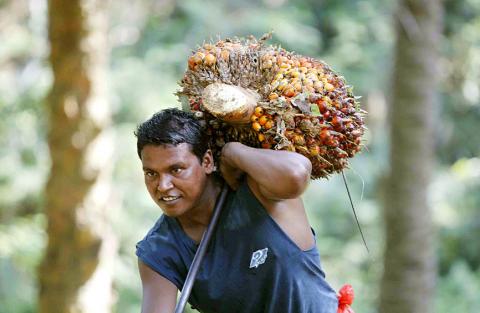Shares of Malaysian palm oil giant Felda soared as much as 20 percent in their first day of trading yesterday, overcoming weakness in global stock markets after the company completed the world’s biggest initial public offering (IPO) this year after Facebook.
State-backed Felda Global Venture Holdings hit a high of 5.46 ringgit shortly after listing on the main board of Bursa Malaysia, up from its IPO price of 4.55 ringgit. It eased to 5.29 ringgit at the end of the morning session.
Felda’s first-day jump defies sustained weakness in global stock markets and reflects strong investor interest in the world’s third-largest palm oil company.

Photo: Reuters
It also offset worries over a lower-than-expected net profit in the quarter through March.
Felda raised about 10 billion ringgit (US$3.1 billion) in the largest IPO in Asia this year. It is the second-biggest in the world after Facebook, which raised US$16 billion, but suffered a slumping share price after its listing last month. A volatile global economy has led to the shelving of several major IPOs in Asia, including a planned US$2.5 billion share sale by Formula One in Singapore and a US$1.5 billion listing of London-based Graff Diamonds in Hong Kong.
However, Felda’s IPO was supported by 12 institutional investors, including Qatar Investment and French agribusiness giant Louis Dreyfus.
Feldal president Sabri Ahmad said the share price was within expectations. He said Felda, which also plants rubber and sugar cane, would expand in Southeast Asia and Africa.
“Food business is quite resilient in a recession,” he said.
The IPO had met resistance from thousands of ethnic Malay farmers, who partly own the company and fear they would lose out. However, its strong trading debut is expected to help quell concerns and will boost Malaysian Prime Minister Najib Razak, who is expected to call general elections this year. Felda was set up by the government in the 1950s as part of a rural development plan to alleviate poverty by giving poor Malaysians land to grow cash crops, mainly palm oil and rubber.
Najib has assured the farmers that the listing would be profitable for them, and promised a 1.68 billion ringgit windfall for the farmers and their families. Felda has also allocated 20 percent of its shares to a trust fund for the farmers, who will receive annual dividends, officials said.
The Felda group owns 70 palm oil mills, seven refineries and a string of other manufacturing plants nationwide. It produces about 3 million tonnes of crude palm oil annually, or about 8 percent of world output.
After Felda, Asia’s largest hospital operator, Integrated Healthcare Holdings, is also planning an IPO that could raise as much as 1.9 billion ringgit.

The US dollar was trading at NT$29.7 at 10am today on the Taipei Foreign Exchange, as the New Taiwan dollar gained NT$1.364 from the previous close last week. The NT dollar continued to rise today, after surging 3.07 percent on Friday. After opening at NT$30.91, the NT dollar gained more than NT$1 in just 15 minutes, briefly passing the NT$30 mark. Before the US Department of the Treasury's semi-annual currency report came out, expectations that the NT dollar would keep rising were already building. The NT dollar on Friday closed at NT$31.064, up by NT$0.953 — a 3.07 percent single-day gain. Today,

‘SHORT TERM’: The local currency would likely remain strong in the near term, driven by anticipated US trade pressure, capital inflows and expectations of a US Fed rate cut The US dollar is expected to fall below NT$30 in the near term, as traders anticipate increased pressure from Washington for Taiwan to allow the New Taiwan dollar to appreciate, Cathay United Bank (國泰世華銀行) chief economist Lin Chi-chao (林啟超) said. Following a sharp drop in the greenback against the NT dollar on Friday, Lin told the Central News Agency that the local currency is likely to remain strong in the short term, driven in part by market psychology surrounding anticipated US policy pressure. On Friday, the US dollar fell NT$0.953, or 3.07 percent, closing at NT$31.064 — its lowest level since Jan.

Hong Kong authorities ramped up sales of the local dollar as the greenback’s slide threatened the foreign-exchange peg. The Hong Kong Monetary Authority (HKMA) sold a record HK$60.5 billion (US$7.8 billion) of the city’s currency, according to an alert sent on its Bloomberg page yesterday in Asia, after it tested the upper end of its trading band. That added to the HK$56.1 billion of sales versus the greenback since Friday. The rapid intervention signals efforts from the city’s authorities to limit the local currency’s moves within its HK$7.75 to HK$7.85 per US dollar trading band. Heavy sales of the local dollar by

The Financial Supervisory Commission (FSC) yesterday met with some of the nation’s largest insurance companies as a skyrocketing New Taiwan dollar piles pressure on their hundreds of billions of dollars in US bond investments. The commission has asked some life insurance firms, among the biggest Asian holders of US debt, to discuss how the rapidly strengthening NT dollar has impacted their operations, people familiar with the matter said. The meeting took place as the NT dollar jumped as much as 5 percent yesterday, its biggest intraday gain in more than three decades. The local currency surged as exporters rushed to